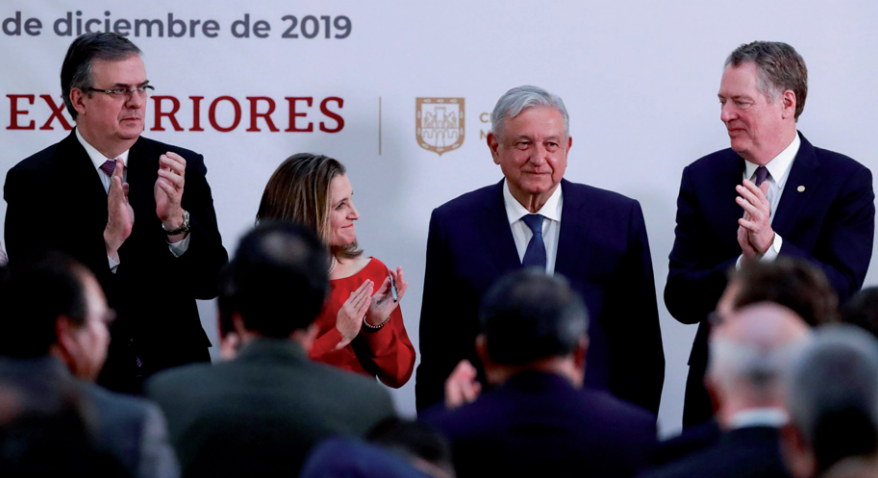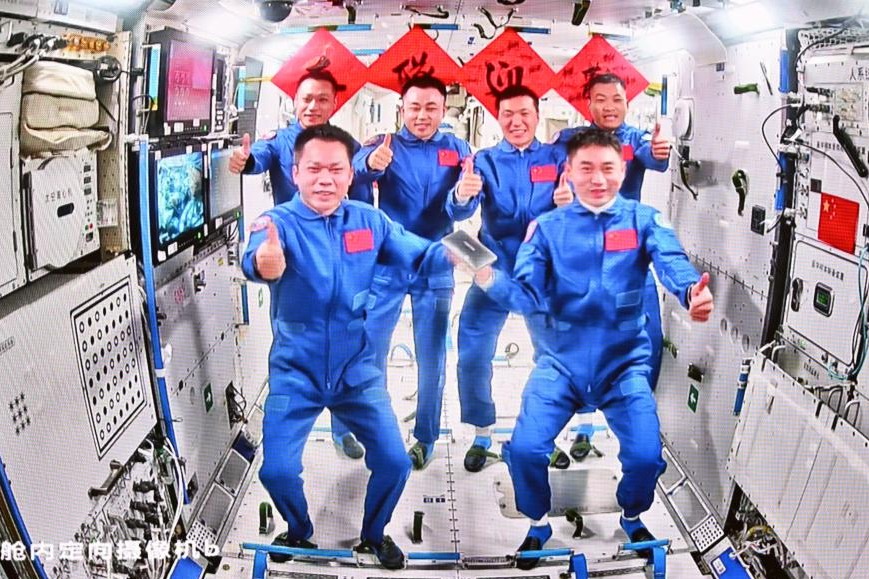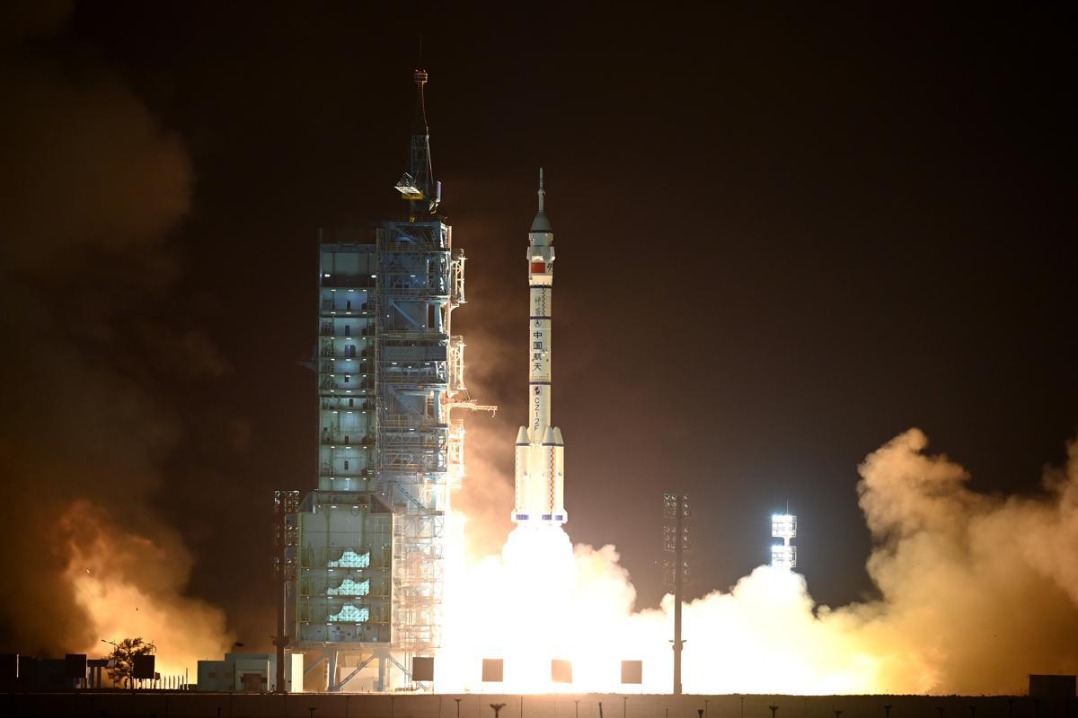Compromise hailed as revised USMCA on trade is signed
By HENG WEILI in New York | China Daily Global | Updated: 2019-12-11 23:24

HENRY ROMERO / REUTERS
The signing of a revamped trade pact among the United States, Canada and Mexico on Tuesday was praised as a rare moment of cooperation in a world divided by trade and political disputes.
The ceremonial signing of the United States-Mexico-Canada Agreement (USMCA) in Mexico City on Tuesday could carry across the finish line US President Donald Trump's three-year effort to revise the 1994 North American Free Trade Agreement (NAFTA), which he has said cost millions of American manufacturing jobs.
The deal was signed by Mexican President Andres Manuel Lopez Obrador, Canadian Deputy Prime Minister Chrystia Freeland and US Trade Representative Robert Lighthizer.
"After working with Republicans, Democrats and many other stakeholders for the past two years, we have created a deal that will benefit American workers, farmers and ranchers for years to come," Lighthizer said. "This will be the model for American trade deals going forward."
Lighthizer called it "a miracle" that the deal came together; Lopez Obrador credited Trump for working with him, while Freeland celebrated a win for multilateralism.
"This is a win-win-win agreement which will provide stability for working people in all three countries for years to come. That is no small thing," she said.
For Democrats, the deal also serves as a rebuttal to Trump's and Republicans' assertions that their only agenda was pursuing his impeachment, the articles of which were approved on the same day as the USMCA.
A US House vote on USMCA is likely before Congress adjourns for the year, and the Senate is expected to vote in January or February.
Senate Majority Leader Mitch McConnell said the vote on the USMCA will likely occur after an expected impeachment trial in the Senate.
The deal also will require Trump's signature and final approval by the Mexican and Canadian legislatures.
While one trade deal was reached, another big one is pending — with China. Trump has five days to decide whether to impose tariffs on nearly $160 billion in Chinese consumer goods 10 days before Christmas. An enactment of the tariffs could derail prospects for a "Phase One" trade deal between the world's two largest economies.
The White House's top economic and trade advisers, including Lighthizer, Larry Kudlow, Peter Navarro and Treasury Secretary Steven Mnuchin are expected to meet with Trump over that decision, a person briefed on the situation said.
"The reality is those tariffs are still on the table, the Dec 15 tariffs, and the president has indicated if the short strokes remaining in negotiations do not pan out to his liking that those tariffs could go back into place," Kudlow said at a Wall Street Journal conference.
The Trump administration said in August it would put 15 percent tariffs on billions in Chinese-made consumer goods on Dec 15. Those tariffs would affect items such as video game consoles, computer monitors, Christmas decorations and toys. Goods that would be affected by the Dec 15 tariffs include industrial goods such as pesticides and other chemicals, but also consumer items in demand around the Christmas and New Year's holidays, according to a Reuters analysis of the tariff list announced in August. They include plastic tableware, handbags, photo albums, woolen bathrobes, silk pajamas, turntables and jeweled wristwatches.
"It was necessary to get the USMCA agreement out of the way to focus the US negotiators back onto the China trade talks," Douglas H. Paal, distinguished fellow, Asia Program at the Carnegie Endowment for International Peace, told China Daily. "There are only so many people with a lot of work to do, so they do it one issue at a time. I still think both sides need an agreement, but only a little.
"The China-US trade deal could still collapse or drag out beyond the election, but the chances are relatively small," Paal said.
Among the key aspects of the USMCA deal were improved enforcement of worker rights. Democrats also succeeded in removing a 10-year protection for manufacturers of new drugs, including biologics, that had won a reprieve from lower-cost competition in the original accord.
But House Speaker Nancy Pelosi said she lost a bid to remove liability protections for internet service providers, which she had called a "giveaway" to big tech companies.
The USMCA was signed more than a year ago to replace NAFTA, but Democrats controlling the House of Representatives pushed for major changes to labor and environmental enforcement.
Delays primarily by Democrats and US organized labor at times threatened to sideline the deal, perplexing American farmers already burdened by tariffs resulting from Trump's trade dispute with China.
"There is no question of course that this trade agreement is much better than NAFTA," Pelosi said, adding that it is "infinitely better than what was initially proposed by the administration".
"It will be the best and most important trade deal ever made by the USA. Good for everybody — Farmers, Manufacturers, Energy, Unions — tremendous support. Importantly, we will finally end our Country's worst Trade Deal, NAFTA!," Trump tweeted.
"There is no denying that the trade rules in America will now be fairer because of our hard work and perseverance. Working people have created a new standard for future trade negotiations,"said AFL-CIO President Richard Trumka. "President Trump may have opened this deal. But working people closed it."
The pact requires that 40-45 percent of cars eventually be made in countries that pay autoworkers at least $16 an hour — that is, in the United States and Canada and not in Mexico. The deal was criticized by some business groups in Mexico.
Senator Pat Toomey, a Pennsylvania Republican, said the pact veered to the left politically and "undermines the free flow of capital" from the US to its trading partners.
"This is basically NAFTA with a few modernizations, and some restrictions on trade and an expiration date. If people think that's a huge improvement, then I guess they'll be happy with it," Toomey told reporters.
But Senator Rob Portman, Republican of Ohio, told The New York Times that such a compromise in a divided government "is a rare feat around here, and we should celebrate it".
Zhao Huanxin in Washington, Reuters and The Associated Press contributed to this story.
The signing of a revamped trade pact among the United States, Canada and Mexico on Tuesday was praised as a rare moment of cooperation in a world divided by trade and political disputes.
The ceremonial signing of the United States-Mexico-Canada Agreement (USMCA) in Mexico City on Tuesday could carry across the finish line US President Donald Trump's three-year effort to revise the 1994 North American Free Trade Agreement (NAFTA), which he has said cost millions of American manufacturing jobs.
The deal was signed by Mexican President Andres Manuel Lopez Obrador, Canadian Deputy Prime Minister Chrystia Freeland and US Trade Representative Robert Lighthizer.
"After working with Republicans, Democrats and many other stakeholders for the past two years, we have created a deal that will benefit American workers, farmers and ranchers for years to come," Lighthizer said. "This will be the model for American trade deals going forward."
Lighthizer called it "a miracle" that the deal came together; Lopez Obrador credited Trump for working with him, while Freeland celebrated a win for multilateralism.
"This is a win-win-win agreement which will provide stability for working people in all three countries for years to come. That is no small thing," she said.
For Democrats, the deal also serves as a rebuttal to Trump's and Republicans' assertions that their only agenda was pursuing his impeachment, the articles of which were approved on the same day as the USMCA.
A US House vote on USMCA is likely before Congress adjourns for the year, and the Senate is expected to vote in January or February.
Senate Majority Leader Mitch McConnell said the vote on the USMCA will likely occur after an expected impeachment trial in the Senate.
The deal also will require Trump's signature and final approval by the Mexican and Canadian legislatures.
While one trade deal was reached, another big one is pending — with China. Trump has five days to decide whether to impose tariffs on nearly $160 billion in Chinese consumer goods 10 days before Christmas. An enactment of the tariffs could derail prospects for a "Phase One" trade deal between the world's two largest economies.
The White House's top economic and trade advisers, including Lighthizer, Larry Kudlow, Peter Navarro and Treasury Secretary Steven Mnuchin are expected to meet with Trump over that decision, a person briefed on the situation said.
"The reality is those tariffs are still on the table, the Dec 15 tariffs, and the president has indicated if the short strokes remaining in negotiations do not pan out to his liking that those tariffs could go back into place," Kudlow said at a Wall Street Journal conference.
The Trump administration said in August it would put 15 percent tariffs on billions in Chinese-made consumer goods on Dec 15. Those tariffs would affect items such as video game consoles, computer monitors, Christmas decorations and toys. Goods that would be affected by the Dec 15 tariffs include industrial goods such as pesticides and other chemicals, but also consumer items in demand around the Christmas and New Year's holidays, according to a Reuters analysis of the tariff list announced in August. They include plastic tableware, handbags, photo albums, woolen bathrobes, silk pajamas, turntables and jeweled wristwatches.
"It was necessary to get the USMCA agreement out of the way to focus the US negotiators back onto the China trade talks," Douglas H. Paal, distinguished fellow, Asia Program at the Carnegie Endowment for International Peace, told China Daily. "There are only so many people with a lot of work to do, so they do it one issue at a time. I still think both sides need an agreement, but only a little.
"The China-US trade deal could still collapse or drag out beyond the election, but the chances are relatively small," Paal said.
Among the key aspects of the USMCA deal were improved enforcement of worker rights. Democrats also succeeded in removing a 10-year protection for manufacturers of new drugs, including biologics, that had won a reprieve from lower-cost competition in the original accord.
But House Speaker Nancy Pelosi said she lost a bid to remove liability protections for internet service providers, which she had called a "giveaway" to big tech companies.
The USMCA was signed more than a year ago to replace NAFTA, but Democrats controlling the House of Representatives pushed for major changes to labor and environmental enforcement.
Delays primarily by Democrats and US organized labor at times threatened to sideline the deal, perplexing American farmers already burdened by tariffs resulting from Trump's trade dispute with China.
"There is no question of course that this trade agreement is much better than NAFTA," Pelosi said, adding that it is "infinitely better than what was initially proposed by the administration".
"It will be the best and most important trade deal ever made by the USA. Good for everybody — Farmers, Manufacturers, Energy, Unions — tremendous support. Importantly, we will finally end our Country's worst Trade Deal, NAFTA!," Trump tweeted.
"There is no denying that the trade rules in America will now be fairer because of our hard work and perseverance. Working people have created a new standard for future trade negotiations,"said AFL-CIO President Richard Trumka. "President Trump may have opened this deal. But working people closed it."
The pact requires that 40-45 percent of cars eventually be made in countries that pay autoworkers at least $16 an hour — that is, in the United States and Canada and not in Mexico. The deal was criticized by some business groups in Mexico.
Senator Pat Toomey, a Pennsylvania Republican, said the pact veered to the left politically and "undermines the free flow of capital" from the US to its trading partners.
"This is basically NAFTA with a few modernizations, and some restrictions on trade and an expiration date. If people think that's a huge improvement, then I guess they'll be happy with it," Toomey told reporters.
But Senator Rob Portman, Republican of Ohio, told The New York Times that such a compromise in a divided government "is a rare feat around here, and we should celebrate it".
Zhao Huanxin in Washington, Reuters and The Associated Press contributed to this story.
























